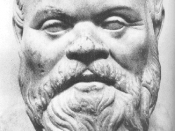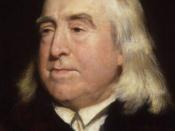This essay will deal with the problems and prospects for Utilitarianism, outlining the basic tenants of its philosophy and the problems that can occur while using it as a basis for moral living. It will outline, evaluate, and dismiss three different strands; act utilitarianism, rule utilitarianism and the last which is a combination of both. The history should be illustrated putting into context why utilitarianism was initially attractive; this will also demonstrate where the modern thought originated. This essay will prove that as a basis for moral living, utilitarianism is not a viable option as it currently stands. It is also advocated that one of the greatest thinker and writers of this movement, JS Mill, was not even utilitarian, despite his assertions to the contrary.
Jeremy Bentham was the modern father of utilitarianism, but he has his antecedents in the Epicureans, and influence from the writings John Hume, as well as his contemporary, William Paley.
Paley advocated a type of Utilitarianism that was influenced by Christian theology. However Bentham was the first to bring all the theory together as a cohesive whole under the heading of act utilitarianism. "[the utilitarian movement was] essentially practical in outlook, orientated towards legal, penal, and political reform." Bentham started his career following his father at the Bar. It is noted by Coplestone that this was not the career he desired and what he preferred was "the life of reflection to that of a practicing lawyer." His interest was directed towards reform of the law with regard to the utility of the law in dealing with offenders; his reflection was directed towards the most desirable consequences in the penal system. Due to the opposition and rejection of his ideas he became convinced that the whole system needed a radical overhaul; therefore political reform was required.


